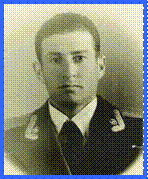Arcadi Sobol
I was born June 14, 1930 in the Ukraine.
We were a family of five – my father Shulim Sobol, my mother Masia Moaisievna, me – 12 years old, my little sister Batya aged 5, and my little brother Itzik aged 2. Before the war we lived in the town of Bar in the Vinnytsia province which had a population of around 12,000.
On July 16th the Germans entered the town and introduced a new regime.
The kommandat was set up, which soon became the gebiestkomissriat. A Ukrainian leadership was also established headed by Kolibfrik, a former teacher who was joined by other traitors. They welcomed the Nazis, in accordance with Ukrainian tradition, with bread and salt, wearing embroidered shirts.
Gregory Androsov, the former dog catcher, became Police Chief. He was particularly cruel and committed mass murders (he threw children and babies into pits, alive, and then shot them with his pistol).
After a while, three ghettos were established in the town where all the Jews were pooled. The local residents were evacuated from there. A judenrat was chosen for the ghettos. Formally it operated as a police force. Later, an order was issued for all those from the ghettos who were capable of working to take on forced labor. All the residents who were able to walk were expelled from their houses and assembled in the square next to the monastery. The bedridden and those who were unable to walk were shot on the spot.
On August 19, 1942 the Germans separated those who were unfit for work – the sick and the old. They included my grandmother, Hinia Spektor. They were herded, on foot and in carts, by the polizei (Nazi police) and the einsatzgruppen (death force) which had arrived the day before along a dirt track by the market. There were pits there that had been dug previously. There the Nazis and their helpers carried out the atrocity. We only heard about it in the evening.
We continued living behind barbed wire fences and watchtowers. There was no food and no way of making a living. Those of us who still had something of value engaged in barter. The Ukrainians and Russians lived not far from the ghetto and sometimes they helped with whatever they could. After all, we had lived side by side with these people for many years. I sometimes crawled out under the fence, in the evening or at night, and I got out of the ghetto. I’d go to exchange things of value for food. I was sent to work every day to chop kindling in the forest and to light the ovens in the kommandat. Sometimes someone would bring a little food and I’d do my best to leave some to bring home and not eat it all myself, even though I was constantly hungry. At home, my two year old brother, Itzik, always asked for food, as did my little sister Batya.
On the evening of the second roundup, in the second half of October, a former neighbor, a good man called Vassily who worked in the Nazi police force, came to us and told us that “avengers” had come to the town, and that there would be another pogrom in the coming days. Later that evening, after he’d left, my father, mother and I went to all the neighbors to warn them.
Not everyone believed us, but those who listened to our advice and tried to get out of the ghetto managed to survive.
Dad and mom asked Vassily to take my sister Batya to former neighbors of ours, the Zelniek family, as we had previously made this arrangement with them. My parents decided that if we died, at least one member of the family would be able to survive. But that wasn’t going to happen… we managed to escape from the ghetto at night. We went to a place we had previously prepared in the event that we had to run away.
The next morning, October 15 1942, the second roundup took place. We sat in the attic of the Mordovitch family’s stables and watched the people being led away to their deaths. Sadly, we could do nothing.
We got through the day safely in the attic. Vassily’s brother, Peter Vassily, came to see us and brought bread and potatoes and encouraged us. We had not eaten or drunk anything for a whole day. There were 18 more people, including children, besides us in the attic.
We went down from the attic and, under cover of night, we followed Peter Andreivitch through the valley, crossed the Rob River and found ourselves in Romania.
There we took our leave and we walked three kilometers to a village called Pliabka where a good friend of my father’s, Peter Slobodiniuk, lived.
He hid us in a storeroom, in a pile of hay, but then it turned out that there were Nazis in the village. We did not leave the storeroom for two days.
Dad asked Peter to go to our town, Bar, and to get Batya from the neighbors and bring her to us. In the evening Peter came back and told us that a policeman called Broshnitzki , also a former neighbor, had gone to the neighbors and told Batya “come with me, I’ll take you to your parents.” It was only years later that we discovered he, himself, had shot her.
We left Pliabka and went to Kopai by cart. Before we got there Peter left us off and said, “you have to go on from here alone.”
We got to the town but there were new troubles ahead. We did not have any food or clothes, and certainly no money. We didn’t take anything with us when we ran away. There, too, we lived in a ghetto but at least there was no killing.
And so, poverty stricken, we survived until 1944 when the Red Army liberated the town. After that I finished 9 years of education at Junior High School No. 6 and then I joined the army. I completed my studies at a military college. I got married. My wife’s name is Bella Sobol. I served at Chokotaka on the island of Sakhlin in the Kuril Islands. After I completed my military service I went to Vinnytsia where I worked in various jobs. In 1991 I made Aliyah. Today we have two sons and three grandchildren.





